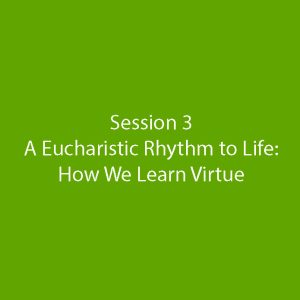Session 3: A Eucharistic Rhythm to Life: How We Learn Virtue
Scriptural Theme
“The cup of blessing that we bless, is it not a participation in the blood of Christ? The bread that we break, is it not a participation in the body of Christ? Because there is one bread, we who are many are one body, for we all partake of the one bread” (1 Corinthians 10:16-17, ESV).
“What is the benefit of this eating and drinking? These words, ‘Given and shed for you for the forgiveness of sins,’ show us that in the Sacrament forgiveness of sins, life, and salvation are given us through these words. For where there is forgiveness of sins, there is also life and salvation” (Luther’s Small Catechism, Concordia Publishing House, 2017, p. 29).
The Formula of Concord states, “Next, the Holy Spirit dwells in the elect who have believed as he dwells in his temple and is not idle in them but impels the children of God to obey God’s commands. Therefore, believers should in the same way not be idle either, much less resist the impetus of God’s Spirit, but should practice all Christian virtues, godliness, modesty, moderation, patience, and love for one another—and should diligently seek to ‘confirm their call and election’ [2 Peter 1:10], so that the more they recognize the Spirit’s power and strength in themselves, the less they doubt their election. For God’s Spirit testifies to the elect that they ‘are God’s children’ [Romans 8:14-17]” (The Book of Concord: The Confessions of the Evangelical Lutheran Church, Fortress Press, Minneapolis, 2000, p. 652).

